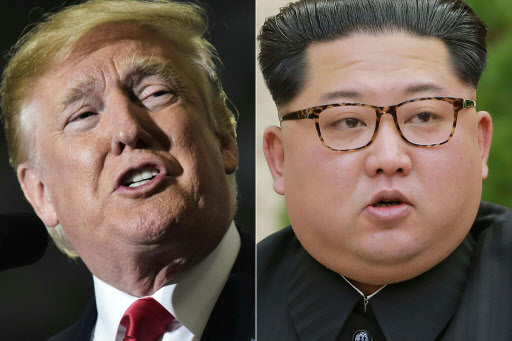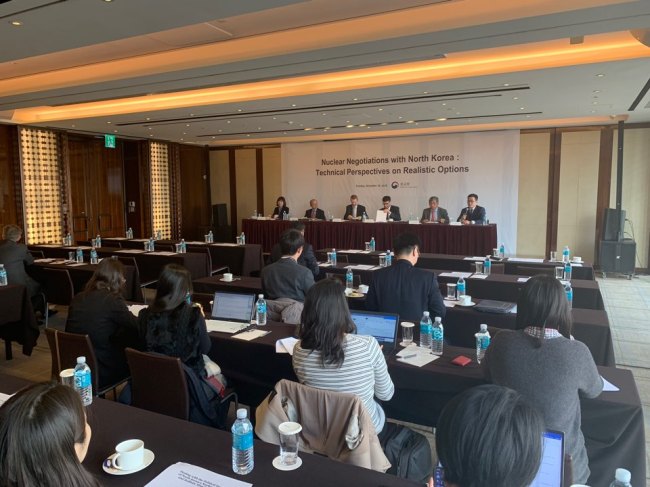The US could accept a limited version of North Korea’s denuclearization and offer a reward short of sanctions relief to move forward stalled denuclearization talks, experts said Tuesday.
 |
(Yonhap) |
Although the extent of North Korea’s nuclear capabilities is uncertain, there is strategic value for South Korea and the US to contain the risks with measures that are short of full denuclearization, said James Acton, a research fellow at Carnegie Endowment for International Peace.
“There would be some strategic value to constraining North Korea’s program further, short of complete denuclearization. But because that value would be limited, in return, we should offer North Korea less than sanctions relief. In other words, less for less,” Acton said at a seminar in central Seoul.
“North Korea gives us less, we offer North Korea less in return.”
 |
Presenters speak during a seminar on "Nulcear negotiations with North Korea: technical perspectives on realistic options" was held Tuesday in central Seoul. (Ministry of Foreign Affairs) |
As North Korea appears to be resistant to declaring a full inventory of its nuclear weapons, the US could begin by fulfilling goals that are “less ambitious, very straightforward and easy to verify,” which could help the countries build trust, he said.
Besides, he said, a declaration of the nuclear weapons sites could be a “poison pill”: technically difficult for both North Korea and the US, as it would be tough to prove whether the other side was telling the truth.
“If you have more limited, modest goals, you don’t have to do the declaration up front. You could take measures that have more chances of success,” he said.
From a technical perspective, the negotiating scenario could involve North Korea first agreeing to sign and ratify the Comprehensive Nuclear Test Ban Treaty, impose a moratorium on intercontinental ballistic missile tests of all ranges, and suspend all ground-based missile engine tests.
The North could then agree to suspend all operations at the Yongbyon nuclear complex and undergo inspection by the International Atomic Energy Agency, and dismantle all the facilities there. After that, the North could agree not to operate nuclear reactors and not to produce tritium used for its nuclear weapons program, he suggested.
What the US could offer the North in return could be negotiated, he said.
“UN sanctions relief that could enable North Korea-South Korea joint projects to go ahead, I think that could be valued,” he said.
North Korea has called on the US to reward it for all the measures it has taken so far -- including a moratorium on nuclear and missile tests and dismantling of its major nuclear test site in Punggye-ri. The US demands that the North take more concrete denuclearization steps first.
Such differences have led to an impasse in working-level denuclearization talks between the US and North Korea, though the two countries seek to hold another summit early next year.
Toby Dalton, co-director of the Nuclear Policy Program at the Carnegie Endowment, also said the unilateral disarmament of North Korea is not a realistic option.
“If the intention is to build confidence, you shouldn’t start with a document in which you automatically look for discrepancies. You need to start with things North Korea is willing to do,” he said.
Dalton suggested the concept of Comprehensive Verifiable Capping, which could effectively cap the North’s nuclear program. North Korea could temporarily retain its nuclear arsenal under some agreed constraints without any quantitative or qualitative improvement, along with steps to reduce readiness and guarantee transparency, he said.
(
laeticia.ock@heraldcorp.com)






![[Exclusive] Hyundai Mobis eyes closer ties with BYD](http://res.heraldm.com/phpwas/restmb_idxmake.php?idx=644&simg=/content/image/2024/11/25/20241125050044_0.jpg)

![[Herald Review] 'Gangnam B-Side' combines social realism with masterful suspense, performance](http://res.heraldm.com/phpwas/restmb_idxmake.php?idx=644&simg=/content/image/2024/11/25/20241125050072_0.jpg)
